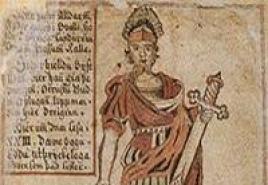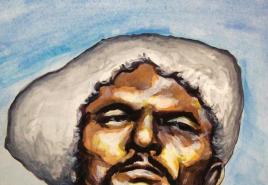Teacher's calendar for the school year.
Ludwig van Beethoven is one of the most famous and talented composers in history. He, along with Mozart, is often called the greatest musicians of all times.
Beethoven's biography is interesting because, despite being completely deaf, he managed to write more than 650 works of genius.
Brief biography of Beethoven
Ludwig van Beethoven was born on December 16, 1770 in the German city of Bonn. His father Johann was a singer in the court chapel. Mother, Mary Magdalene, was the daughter of a cook who worked at court.
Childhood and youth
Little Ludwig's childhood can hardly be called joyful and carefree. The family in which he grew up had a modest income. In addition, the head of the family abused alcohol and often showed aggression towards loved ones. When he got drunk, he beat his wife and sometimes his son.
Despite the drinking, Beethoven Sr. was interested in his child’s abilities. He immediately noticed his excellent hearing and began teaching him to play the violin and harpsichord.
Perhaps my father chose these particular instruments because the great one played them in childhood, whose fame resounded throughout Europe.
However, Ludwig did not have any special abilities in playing the violin and harpsichord. Then his father began to force him to play the organ, viola, piano and flute.
When a son made even a minor mistake, he could earn himself a serious spanking. Beethoven's father wanted Ludwig to receive the same fame as. Then their family would become famous throughout Europe and could significantly improve their financial situation.
 Beethoven in his youth
Beethoven in his youth When Beethoven was 6 years old, he performed for the first time in his biography in Cologne. However, the fee for the concert turned out to be very modest, which greatly disappointed the head of the family.
Despite this, little Ludwig continued to study music, and only his mother constantly supported and encouraged him. Soon he began to improvise and write his first works.
At times he became so immersed in the process of composing music that it was difficult for him to get out of this state.
In 1782, Christian Gottlobu, who was the director of the court chapel, became the teacher of the young Beethoven. He was able to discern Beethoven’s unusual gift, so he worked with him with particular interest. In addition to music lessons, Christian instilled in Beethoven a love for.
Soon Ludwig became interested in reading world classics. Along with this, he was delighted with the works of Handel, Bach and, of course, Mozart, with whom the boy dreamed of performing on the same stage.
In 1787 his dream came true. Once in Vienna, he met his idol. He even managed to play some of his compositions for him, upon hearing which Mozart was delighted.
After finishing Beethoven’s performance, he openly declared: “Don’t take your eyes off this boy - one day the world will talk about him.” Further biography of Beethoven showed that these words were prophetic.
Ludwig wanted to meet the great Mozart again, but due to his mother’s illness, from which she would later die, he had to urgently return home.
The death of his mother was a real tragedy for Beethoven. He became despondent and for some time had no interest in music at all. Moreover, he now had to take care of two little brothers and constantly endure his father's drunken antics.
In addition, he was subjected to ridicule from his peers, because he claimed that thanks to his writings he would soon become very rich.
Soon a bright streak began in his biography. In Bonn, the composer met the Breuning family, who took him under their protection. Ludwig began teaching their daughter Lorchen, with whom he maintained friendly relations into adulthood.
Creative biography
In 1792, young Beethoven went to Vienna, where he managed to find good friends and patrons of the arts. He understood perfectly well that he needed to improve his skills, so he decided to turn to Joseph Haydn for help.
However, the relationship between them did not work out, as Haydn was irritated by Beethoven’s tough temper. After this, Ludwig began to study with Schenck and Albrechtsberger. Antonio Salieri helped him find himself among recognized musicians.
At this time, Beethoven began work on the “Ode to Joy,” which he perfected over the course of many years. Spectators heard this magnificent composition only in 1824.
From that moment on, the composer's popularity began to grow every day. Beethoven becomes one of the most sought-after composers in Vienna. In 1795 he gives his debut concert, in which his works are performed.
The brilliant music made a strong impression on the audience, who appreciated the talent of Ludwig van Beethoven.
After 3 years, he was diagnosed with a serious illness - tinnitus, which slowly progressed over 10 years. She led the musician to the most tragic point in his biography - complete deafness.
One interesting fact is worth noting here. Some biographers claim that Ludwig had a strange habit: before starting work, he would plunge his head into cold water.
It is believed that this is what led to the progression of the disease and subsequent deafness.
However, despite all the difficulties and inconveniences associated with the illness, Beethoven did not give up. As if to spite fate, he managed to write the light and cheerful “Second Symphony”.
Realizing that he is about to go completely deaf, the composer begins to work actively day and night. It was during this period that he wrote some of his best works.
 Beethoven at home at work
Beethoven at home at work In 1808, Beethoven created the famous “Pastoral Symphony”, consisting of 5 movements.
In 1809, he received a lucrative offer to write music for the drama Egmont.
It is worth noting that the composer refused the proposed fee because he was a connoisseur of the work of the German writer.
In 1815 he finally lost his hearing, but Beethoven was no longer able to give up music. Unexpectedly, he finds a wonderful way out of the situation.
To “hear” the music, Beethoven uses a wooden cane. He holds one end of it in his teeth, and the other touches the front panel of the instrument.
Thanks to the vibration, he felt the playing of the instrument, which greatly encouraged and pleased him. The composer continues to write works that become classics during his lifetime.
It is reliably known that Ludwig never liked officials. After he became deaf, his communication with friends took the form of correspondence. In so-called “conversation notebooks” they conducted various dialogues.
The musician Schindler had 3 such notebooks, but he was forced to burn them, as there were many attacks and harsh words against the current government.
Biographers say that one day, while walking with Johann Goethe in the Czech city of Teplice, they met Emperor Franz surrounded by a large crowd of courtiers.
 Teplice incident
Teplice incident Goethe stepped aside and bowed respectfully, in full accordance with the customs then accepted.
Beethoven did not even think of turning away from his path. He walked through the retinue crowded around the monarch, barely touching his hat.
There was even a painting painted for the occasion, which you can see above.
Personal life
In Beethoven's biography there were many tragedies associated with women. Despite his enormous achievements in the musical field, among the elite he was still considered a commoner. Because of this, he could not propose to an upper-class girl.
In 1801, Ludwig falls in love with Countess Julie Guicciardi. But the girl does not reciprocate his feelings and soon marries someone else.
Unrequited love was a real blow for Beethoven. He expressed his feelings in the “Moonlight Sonata,” which is performed today all over the world.
Beethoven's next passion is the widowed Countess Josephine Brunswick, who responded to the courtship of the talented composer. However, Josephine's relatives reminded her that a commoner was not a match for her, as a result of which she stopped communicating with him.
Having experienced a second love drama, the composer proposes to Teresa Malfatti and is again refused. After this, he writes the brilliant sonata “Für Elise”.
 The most famous portrait of Beethoven
The most famous portrait of Beethoven The listed biographical events influenced Beethoven so much that he decided to remain a bachelor for the rest of his life.
In 1815, his brother died, leaving behind his son Karl. Circumstances develop in such a way that it is Beethoven who has to become the boy’s guardian.
It soon became clear that the nephew had a weakness for alcohol. No matter how Beethoven tried to instill in Karl a love of music and eradicate the attraction to drinking, he failed.
Things got to the point that one day the young man wanted to commit suicide, but fortunately he failed to carry out his plan. Ultimately, the composer sent his nephew to serve in the army.
Death
In 1826, Beethoven fell ill with pneumonia, and soon he began to suffer from stomach pain. Due to improper treatment, the disease progressed more and more.
Ludwig was so weak that he could not even walk. Because of this, he spent six months in bed with severe pain.
On March 26, 1827, Ludwig van Beethoven died. An autopsy showed that his liver was completely decomposed.
About 20,000 people came to say goodbye to Beethoven, which once again proved the nation’s love for him. Burial took place in Waring Cemetery.
Some interesting facts from Beethoven's biography
- Beethoven was the first musician to receive a financial allowance from the city council.
- In the 21st century, a popular myth is that the compositions “Music of Angels” and “Melody of Tears of Rain” were written by Beethoven. In fact, they have nothing to do with the great composer.
- Beethoven valued friendship very highly and always helped the poor, although he himself lived in constant need.
- Could work on 5 works at the same time.
- In 1809, when he bombed the city, Beethoven was worried that he would lose his hearing from the shell explosions. So he hid in the basement of the house and covered his ears with pillows.
- In 1845, the first monument dedicated to the composer was opened in Beaune.
- The Beatles' song "Because" is based on the "Moonlight Sonata" played in reverse.
- Beethoven's "Ode to Joy" has been designated as the anthem of the European Union.
- Beethoven died of poisoning due to medical error.
If you liked short biography Beethoven - share it on social networks. If you like biographies outstanding people in general and in particular - subscribe to the site IinterestingFakty.org. It's always interesting with us!
Did you like the post? Press any button.
Ludwig van Beethoven - German composer, conductor, pianist.
Beethoven - brief biography, for children
Ludwig van Beethoven was born on December 16, 1770 in Bonney., Germany, in a family of hereditary musicians. Father, Johann Beethoven was an active man, sometimes hot-tempered. Worked as a singer. He contributed in every possible way to his son’s education. Mother, Maria Magdalene Keverich (nee), daughter of the chef of the Elector Johann Philipp von Walderdorf.
Beethoven early mastered playing the violin, harpsichord, and organ. The first teacher, in addition to his father's home lessons, was K. Nefe, the head of the court chapel. Christian Nefe taught Beethoven the classics: Handel, Haydn, Bach, Mozart.
From the age of 12 Beethoven wrote his compositions. The first is a variation of Dressler's march. At the same age he began his musical career - he received the position of court organist. The talented young man was noticed in Vienna. Mozart, who was popular at that time, predicted a great future for the composer. Beethoven also took lessons from the famous musician.
In 1785, Beethoven was at the disposal of Max Franz II, and later moved to Vienna and gained popularity with Archduke Rudolf, Count Kinsky and Prince Lobkowitz. Each of the listed rulers tried to invite Beethoven to play music at balls as often as possible.
In 1814 - the period of general popularity of the composer. The main musical activity now took place only in Vienna, although smaller cities from time to time were honored with the honor of receiving a new star of the musical Olympus of Germany.
During this period, the previously identified Beethoven's disease - deafness took away the opportunity to earn a living, create and enjoy life. Beethoven did not give up his concert activities until the last moment, and continued to write music even after the victory of his illness - he dictated notes to his father-in-law.
Beethoven's works of the 18th-19th centuries:
- Sonata No. 8 for piano “Pathetique”
- Sonata No. 14 “Moonlight” for piano;
- Oratorio “Christ on the Mount of Olives”;
- “Kreutzer Sonata” for violin and piano;
- “The third symphony – dedicated to Napoleon I – “Heroic”;
- Ode "to joy";
- "Ninth Symphony";
- Opera "Fidelio";
About the composer's work: first period– the formation of a composer – is characterized by works for the organ and the general public. The works are sublime, heroic in nature, often dedicated to a patron or famous public figure.
Late period of creativity Beethoven - a harmonious series of piano sonatas. There are a total of 32 of them in the composer’s arsenal. The music becomes heavier, probably overshadowed by the composer's illness, which influenced the author's worldview. His dying work, the Ninth Symphony of 1823, differs from more early works. She became a strange and painful point in the same short life, as a biography of the German composer.
Beethoven on music:
- Music is a popular need.
- Music is a mediator between spiritual life and real sensuality.
- There is nothing higher, more beautiful than bringing happiness to many people.
- The heart is the real lever of all great things. What comes from the heart must lead to the heart.
(6 rated, rating: 3,50 out of 5)
As a composer, is that he increased to the highest degree the ability to express instrumental music in conveying emotional moods and extremely expanded its forms. Based on the works of Haydn and Mozart in the first period of his work, Beethoven then began to give the instruments the expressiveness characteristic of each of them, so much so that they, both independently (especially the piano) and in the orchestra, acquired the ability to express the highest ideas and deepest moods of the human soul . The difference between Beethoven and Haydn and Mozart, who also had already brought the language of instruments to high degree development lies in the fact that he modified the forms of instrumental music derived from them, and added deep inner content to the impeccable beauty of the form. Under his hands, the minuet expands into a meaningful scherzo; the finale, which in most cases was a lively, cheerful and unpretentious part for his predecessors, becomes for him the culminating point of the development of the entire work and often surpasses the first part in the breadth and grandeur of its concept. In contrast to the balance of voices, which gives Mozart’s music the character of dispassionate objectivity, Beethoven often gives predominance to the first voice, which gives his compositions a subjective shade, which makes it possible to connect all parts of the work with the unity of mood and idea. What he indicated in some works, such as the Heroic or Pastoral symphonies, with appropriate inscriptions, is observed in most of his instrumental works: the spiritual moods poetically expressed in them are in close correlation with each other, and therefore these works fully deserve the name of poems.
Portrait of Ludwig van Beethoven. Artist J. K. Stieler, 1820
The number of Beethoven's works, not counting works without opus designation, is 138. These include 9 symphonies (the last with a finale for chorus and orchestra on Schiller's ode to Joy), 7 concertos, 1 septet, 2 sextets, 3 quintets, 16 strings quartets, 36 piano sonatas, 16 sonatas for piano with other instruments, 8 piano trios, 1 opera, 2 cantatas, 1 oratorio, 2 large masses, several overtures, music for Egmont, The Ruins of Athens, etc., and numerous works for piano and for single and polyphonic singing.
Ludwig van Beethoven. Best works
By their nature, these writings clearly outline three periods, with a preparatory period ending in 1795. The first period covers the years from 1795 to 1803 (until the 29th work). In the works of this time, the influence of Haydn and Mozart is still clearly visible, but (especially in the piano works, both in the form of a concerto and in the sonata and variations), a desire for independence is already noticeable - and not only from the technical side. The second period begins in 1803 and ends in 1816 (until the 58th work). Here appears a brilliant composer in the full and rich flowering of his mature artistic individuality. The works of this period, revealing a whole world of rich life sensations, at the same time can serve as an example of a wonderful and complete harmony between content and form. The third period includes works with grandiose content, in which, due to Beethoven’s renunciation due to complete deafness from the outside world, thoughts become even deeper, become more exciting, often more immediate than before, but the unity of thought and form in them turns out to be less perfect and often is sacrificed to the subjectivity of mood.
Beethoven's brief biography of the famous composer is presented in this article.
Ludwig van Beethoven short biography
Ludwig van Beethoven was born into a musical family in 1770 in Bonn. As a child, the future composer was introduced to playing musical instruments - organ, harpsichord, violin, flute.
Composer Christian Gottlob Nefe was Beethoven's first teacher. At the age of 12, Beethoven became an assistant organist at court. In addition to studying music, Ludwig studied languages, read such authors as Homer, Plutarch, Shakespeare, while simultaneously trying to compose music.
Beethoven loses his mother early and takes on all the family's expenses.
After moving to Vienna, Beethoven took music lessons from composers such as Haydn, Albrechtsberger, Salieri. Haydn notes the gloomy manner of performance of the future genius of music, but despite this virtuoso.
The composer's famous works appeared in Vienna: the Moonlight Sonata and the Pathétique Sonata. Beethoven's work in the following years is filled with new works: the First and Second Symphonies, “The Creation of Prometheus”, “Christ on the Mount of Olives”.







